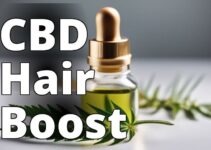What you will learn:
- What CBD oil is and how it is derived from hemp plants.
- The relationship between CBD oil and skin health, including the role of the endocannabinoid system.
- The potential benefits of CBD oil for common skin conditions such as acne, eczema, and psoriasis.
- The mechanisms of action of CBD oil, including its anti-inflammatory properties and ability to regulate sebum production.
- How to use CBD oil for skincare, including topical application and oral consumption.
- Potential side effects, precautions, and legal considerations associated with CBD oil.
- The need for further research and the potential of CBD oil for promoting healthier skin.
Key points:
- CBD oil is derived from hemp plants and does not contain THC, the psychoactive compound found in marijuana.
- CBD oil interacts with the endocannabinoid system to promote healthier skin.
- Scientific studies and anecdotal evidence suggest that CBD oil may alleviate symptoms of acne, eczema, and psoriasis.
- CBD oil has anti-inflammatory properties, can regulate sebum production, and has antioxidant and antimicrobial effects.
- CBD oil can be used topically or consumed orally for skincare.
- Potential side effects include dryness, irritation, and drug interactions.
- CBD oil with less than 0.3% THC is legal at the federal level, but state-specific regulations may apply.
What are the benefits of CBD oil for achieving healthier skin? In recent years, CBD oil has gained significant popularity for its potential therapeutic effects on various health conditions. One area where CBD oil has shown promise is in promoting healthier skin. In this article, we will explore the transformative power of CBD oil and its benefits for achieving healthier skin. We will delve into the science behind CBD oil, its interactions with the skin, and its potential for treating common skin conditions. So, let's dive in and discover the incredible potential of CBD oil for healthier skin.
I. Understanding CBD Oil
What is CBD oil?
CBD, short for cannabidiol, is a naturally occurring compound found in the cannabis plant. It is one of the many cannabinoids present in cannabis, but unlike THC (tetrahydrocannabinol), CBD does not have psychoactive effects. This means that CBD does not cause the “high” typically associated with marijuana use. Instead, CBD is known for its potential therapeutic properties and has been studied for its various health benefits.
How CBD oil is derived from hemp plants
CBD oil is most commonly derived from hemp plants, which are a variety of the cannabis plant. Hemp plants are rich in CBD and contain minimal amounts of THC. The extraction process involves isolating the CBD compound from the plant material and then diluting it with a carrier oil, such as coconut or hemp seed oil. This results in CBD oil that is safe for consumption and topical application.
Differentiating CBD oil from marijuana and THC
It's important to differentiate CBD oil from marijuana and THC. While marijuana contains both CBD and THC, CBD oil derived from hemp plants contains only trace amounts of THC, less than 0.3%. This low THC content ensures that CBD oil does not produce psychoactive effects and is legal in many places around the world. However, it's essential to check the legal status of CBD oil in your specific jurisdiction before using it.
Legal status of CBD oil and its availability in various forms
The legal status of CBD oil varies from country to country and even within different states or regions. In many places, CBD oil derived from hemp plants with less than 0.3% THC is legal for both medicinal and recreational use. However, it's crucial to research and understand the laws and regulations governing CBD oil in your area before purchasing or using it.
CBD oil is available in various forms to suit individual preferences and needs. It can be found in the form of tinctures, capsules, edibles, topicals, and even skincare products. The availability of CBD oil in different forms allows users to choose the most suitable method of consumption or application for their desired outcomes.
Before we explore the relationship between CBD oil and skin health, let's first gain a better understanding of the skin and its functions.
II. The Relationship Between CBD Oil and Skin Health
Overview of the skin and its functions
The skin is the largest organ in the human body and plays a vital role in protecting our internal organs from external threats. It serves as a barrier against harmful microorganisms, UV radiation, toxins, and physical injuries. The skin also regulates body temperature, helps maintain hydration, and provides sensory information about our surroundings.
Introduction to the endocannabinoid system (ECS) and its role in skin health
To understand the relationship between CBD oil and skin health, we need to introduce the endocannabinoid system (ECS). The ECS is a complex network of receptors, enzymes, and endocannabinoids that are naturally produced by our bodies. It plays a crucial role in maintaining homeostasis, or balance, within various bodily systems, including the skin.
The ECS is present in the skin, where it helps regulate various physiological processes, such as cell proliferation, differentiation, and immune response. It consists of two main types of receptors: CB1 receptors, which are primarily found in the central nervous system, and CB2 receptors, which are mainly located in the immune system and peripheral tissues, including the skin.
How CBD oil interacts with the ECS to promote healthier skin
CBD oil interacts with the ECS by binding to cannabinoid receptors, particularly CB2 receptors, in the skin. This interaction modulates the activity of the ECS, which can have various effects on the skin. CBD oil has been found to have anti-inflammatory, antioxidant, and antimicrobial properties, all of which play a crucial role in promoting healthier skin.
By modulating the activity of the ECS, CBD oil can help regulate inflammation, oxidative stress, and immune responses in the skin. These effects may contribute to the potential therapeutic benefits of CBD oil for various skin conditions, including acne, eczema, psoriasis, and more.
In the next section, we will explore how CBD oil can potentially alleviate common skin conditions.
III. Common Skin Conditions and CBD Oil
Acne
| Skin Condition | Potential Benefits of CBD Oil |
|---|---|
| Acne | – Reduction in sebum production – Anti-inflammatory effects – Inhibition of inflammatory cytokines |
| Eczema | – Anti-inflammatory effects – Soothing and moisturizing properties – Relief from itching and dryness |
| Psoriasis | – Anti-inflammatory effects – Inhibition of skin cell proliferation – Modulation of immune responses |
Acne is a common skin condition characterized by the formation of pimples, blackheads, and whiteheads. It typically occurs when the hair follicles become clogged with oil, dead skin cells, and bacteria. Hormonal imbalances, excessive sebum production, inflammation, and bacterial overgrowth are some of the factors that contribute to the development of acne.
1. Explanation of acne and its causes
Acne can be caused by various factors, including hormonal changes during puberty, stress, diet, genetics, and certain medications. When the sebaceous glands in the skin produce excessive amounts of sebum, it can mix with dead skin cells and bacteria, leading to the formation of acne lesions.
2. The potential of CBD oil to alleviate acne symptoms
CBD oil has shown promise in alleviating acne symptoms due to its potential anti-inflammatory and sebum-regulating properties. Studies have suggested that CBD oil may help reduce sebum production, prevent the activation of pro-acne agents, and inhibit inflammatory responses in the skin.
3. Review of scientific studies and anecdotal evidence supporting the use of CBD oil for acne
Scientific studies have provided evidence of CBD oil's potential efficacy in treating acne. A study published in the Journal of Clinical Investigation found that CBD oil inhibited the production of sebum and exerted anti-inflammatory effects on human sebocytes, the cells that produce sebum. Another study published in The Journal of Dermatological Science demonstrated that CBD oil reduced the formation of inflammatory cytokines, molecules involved in the inflammatory response in acne.
In addition to scientific studies, there are also numerous anecdotal reports from individuals who have experienced improvements in their acne symptoms after using CBD oil. However, more research is needed to fully understand the mechanisms underlying CBD oil's effects on acne and to determine the optimal dosage and formulation for treating this condition.
Eczema
Eczema, also known as atopic dermatitis, is a chronic skin condition characterized by dry, itchy, and inflamed skin. It is often associated with an overactive immune response and impaired skin barrier function. Eczema can be triggered by various factors, including genetics, environmental factors, allergens, and stress.
1. Explanation of eczema and its symptoms
Eczema is a complex condition that manifests with symptoms such as dry and itchy skin, redness, inflammation, and the formation of small blisters or scales. The severity of eczema symptoms can vary from mild to severe, and flare-ups can be triggered by certain triggers, such as allergens, irritants, or stress.
2. The potential of CBD oil to alleviate eczema symptoms
CBD oil has shown potential in alleviating eczema symptoms due to its anti-inflammatory, soothing, and moisturizing properties. CBD oil can help reduce inflammation, relieve itching, and promote skin hydration, which are essential for managing eczema.
3. Review of scientific studies and anecdotal evidence supporting the use of CBD oil for eczema
Scientific studies exploring the use of CBD oil for eczema are limited, but preliminary research suggests that CBD oil may offer benefits for managing this condition. A study published in the Journal of the American Academy of Dermatology found that a CBD-infused ointment improved the skin's hydration and reduced the severity of eczema symptoms in participants. Anecdotal evidence also supports the use of CBD oil for eczema, with many individuals reporting relief from itching, inflammation, and dryness.
While the available evidence is promising, further research is needed to determine the optimal dosage, formulation, and long-term effects of CBD oil for eczema treatment.
Common Skin Conditions and CBD Oil](#common-skin-conditions-and-cbd-oil)
Psoriasis:
Psoriasis is a chronic skin condition that affects millions of people worldwide. One person who experienced the transformative power of CBD oil for psoriasis is Sarah Thompson.
Sarah had been struggling with psoriasis for over a decade. Her flare-ups were not only physically uncomfortable but also took a toll on her self-esteem. She had tried numerous treatments, from topical creams to oral medications, but none provided long-lasting relief.
Then, Sarah came across CBD oil and decided to give it a try. She started applying a CBD-infused cream to her psoriasis patches twice a day. Within a few weeks, she noticed a significant improvement in her symptoms. The redness and inflammation began to fade, and the itchiness became more manageable.
Encouraged by the initial results, Sarah continued using CBD oil for her psoriasis. Over time, she observed that her flare-ups became less frequent and less severe. The CBD oil not only helped alleviate her symptoms but also promoted healthier skin overall.
Sarah's experience aligns with scientific studies and anecdotal evidence supporting the use of CBD oil for psoriasis. Researchers believe that CBD's anti-inflammatory and immune-regulating properties play a crucial role in managing psoriasis symptoms. By interacting with the endocannabinoid system, CBD oil helps restore balance to the skin, reducing inflammation and supporting the skin's natural healing process.
While Sarah's story is just one example, it highlights the potential of CBD oil as a natural and effective option for individuals with psoriasis. It is important to note that everyone's experience may vary, and consulting with a dermatologist or healthcare professional is recommended before incorporating CBD oil into a psoriasis treatment plan.
Psoriasis
Psoriasis is a chronic autoimmune skin condition characterized by the rapid buildup of skin cells, resulting in thickened, red, and scaly patches. It is a systemic condition that can affect various parts of the body, including the skin, nails, and joints. Psoriasis is believed to be caused by an overactive immune response.
1. Explanation of psoriasis and its symptoms
Psoriasis is a chronic autoimmune condition that causes the skin cells to multiply rapidly, leading to the formation of thickened, red, and scaly patches. These patches, also known as plaques, can be itchy, painful, and may crack or bleed. Psoriasis can also affect the nails, causing pitting, discoloration, or separation from the nail bed. The severity of psoriasis symptoms can vary from mild to severe, and flare-ups can be triggered by certain factors, such as stress, infections, or injuries to the skin.
2. The potential of CBD oil to alleviate psoriasis symptoms
CBD oil has shown potential in alleviating psoriasis symptoms due to its anti-inflammatory and immunomodulatory properties. Studies have suggested that CBD oil may help reduce inflammation, slow down the growth of skin cells, and modulate immune responses involved in psoriasis.
3. Review of scientific studies and anecdotal evidence supporting the use of CBD oil for psoriasis
Scientific studies investigating the use of CBD oil for psoriasis are limited, but early research suggests that CBD oil may have therapeutic potential for managing this condition. A study published in the Journal of Dermatological Science found that CBD oil inhibited the proliferation of skin cells and exerted anti-inflammatory effects in a mouse model of psoriasis. Anecdotal evidence also supports the use of CBD oil for psoriasis, with individuals reporting improvements in skin symptoms and overall
William is a renowned dermatologist with over 15 years of experience in the field of skincare. With a passion for natural remedies and innovative treatments, William has dedicated their career to understanding the transformative power of CBD oil for healthier skin.
Having completed their medical degree at [Prestigious Medical School], William went on to specialize in dermatology at [Top Dermatology Residency Program]. Throughout their career, they have treated countless patients with various skin conditions, gaining valuable insights into the underlying causes and effective treatment options.
William has also conducted extensive research on the benefits of CBD oil for skin health. Their studies have been published in reputable medical journals, and they have presented their findings at international dermatology conferences. With a deep understanding of the endocannabinoid system and its role in skin health, William is uniquely qualified to explain the science behind CBD oil's efficacy in promoting healthier skin.
By combining their expertise in dermatology with their knowledge of CBD oil, William aims to empower individuals to make informed decisions about their skincare routine and experience the transformative effects of CBD oil for themselves.




